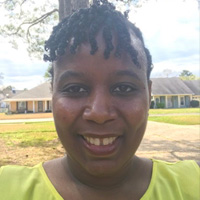Felecia Bowser
Location: Tallahassee, FL
Office: WFO Tallahassee
Job Title: Meteorologist-in-Charge.
Educational Background:
- B.S. from Penn State University
- M.S. from Texas Tech University
Describe the career path that led you to your current job with the National Weather Service.
- While attending graduate school at Texas Tech University, a retired NWS Science and Operations Officer asked me about my plans once graduating with my Masters. He then went on to tell about the NWS which happened to be in the city I was attending graduate school and how I could start off as a volunteer to see if this would be something I would be interested in. The rest is history: I started off as a volunteer, then became a SCEP, a Journey Meteorologist, Senior Meteorologist, a Warning Coordination Meteorologist and now a Meteorologist-in-Charge at the NWS Tallahassee, FL office.
What do you do for the NWS?
- As the Meteorologist-in-Charge, I am responsible for the entire staff and office. In essence, I am the captain of the ship but in no way can I steer it straight without working with my team of meteorologists, hydrologists, administratives and service technicians. In order to fulfill the NWS mission of the protection of life and property, it takes knowing when to delegate, and knowing when it is time to roll up your sleeves and get to work.
What was the most interesting, exciting, or impactful weather/water event you experienced while working for the NWS and why does it stand out?
- When I surveyed two catastrophic EF4 tornadoes (the highest is an EF5) with my team of meteorologists that took three days to complete, it was by far one of the most impactful weather events I have observed. Even though there was major destruction to vehicles, homes, businesses, etc. many lives were saved, thanks to the dedication of the meteorologists who were working the event. It made me realize that what I instruct school teachers, emergency management, friends and family to do during a tornado warning (get into the lowest floor, into an interior part of your home and cover your head) may sound simple but it works! I will never forget that.
What made you decide to pursue a career with the NWS?
- My interest in the atmospheric sciences started with when I was 7 years old and my parents gave me a weather book for my birthday.The book informed me about the basic water cycle and basic weather definitions.I was hooked ever since. I am in awe of tornadoes in particular because something that is so small in comparison to the overall parent-storm can do so much damage is quite fascinating.
What do you like most about working for the NWS?
- What I like most about working for the NWS is two fold:I am very much a people-person so I enjoy speaking with the public via severe weather safety classes or cooperative observer trips, and I am humbled to be able to provide a public service that keeps the public safe.
What advice do you have for someone interested in a career with the NWS?
- Head over to your local NWS office in your city/near your city and see about volunteering there.This will give you a taste to see if this is the career that you indeed want to follow.This job can be exciting, but it is hard-work; shift-work is not for the faint of heart but if you want this badly enough, and if you work hard, you can certainly attain your goals.
What training or coursework would you recommend to someone interested in following your career path?
- In order to become a meteorologist, you must have a 4 year degree in Atmospheric Sciences/Meteorology or something equivalent. For example, you can major in math and take meteorology courses that is equivalent to a 4 year degree. Finding the right school is paramount because not every university offers a bachelors in Meteorology so make sure you do your research!
